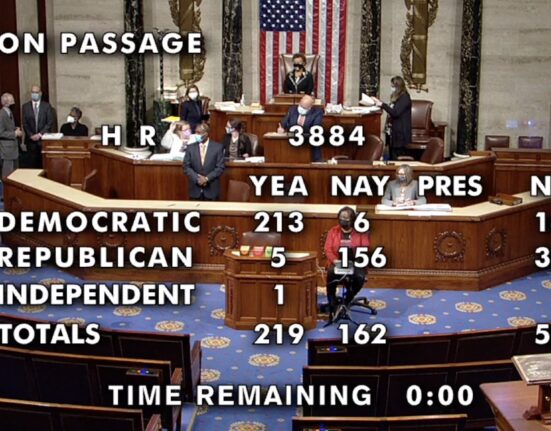Congress has the power to pass legislation that can legalize abortion nationwide. This requires both chambers to agree and the President to sign the bill.
Understanding the role of Congress in shaping abortion laws is pivotal given the ever-evolving legal and moral debates surrounding the topic. As part of the legislative branch of the United States government, Congress can significantly impact abortion rights by enacting laws that can either restrict or expand access to the procedure across the country.
The dynamics of passing such legislation involve careful navigation through political ideologies, party lines, and public sentiment. With the Supreme Court’s previous rulings on abortion, particularly Roe v. Wade, the authority of Congress to legislate on this issue has been a subject of intense discussion. By crafting laws that resonate with the collective will of their constituents, members of Congress play a crucial role in determining the legal status of abortion within the United States.
Introduction To The Abortion Debate In The United States
The United States faces a pivotal crossroads in the historical and ongoing debate over abortion rights. This contentious discussion touches upon legal, ethical, and medical aspects that resonate deeply within American society. Striking a balance between advocating for reproductive rights and respecting various ethical perspectives remains a significant challenge.
Historical Context Of Abortion Legislation
Abortion in the United States has evolved dramatically from a legal standpoint. Initially, abortions were widely practiced without explicit legal prohibitions until the late 19th century when states began to outlaw the procedure. The 1973 landmark Supreme Court decision Roe v. Wade was a turning point, legalizing abortion nationwide and setting the stage for an enduring legal, moral, and political debate.
Current State Of Abortion Rights Post-roe V. Wade Overturn
In recent developments, the Supreme Court overturned Roe v. Wade, signaling a monumental shift in abortion rights. Individual states now hold the power to regulate abortion, leading to a patchwork of laws that vary significantly across the country. Some states maintain protective statutes for abortion rights, while others enact restrictive bans, creating a divided national landscape.

Credit: apnews.com
The Role Of Congress In Shaping Abortion Legislation
The heated debate on abortion rights often points toward the critical role Congress plays. As the legislative branch of the federal government, Congress wields significant power in determining the legal status of abortion across the United States. This central authority embeds Congress as a key stakeholder in influencing abortion legislation.
Constitutional Powers Of Congress
Congress’s authority to legislate stems from the United States Constitution. It possesses the power to pass federal laws and regulate interstate matters, which can include healthcare services such as abortion. This power is not absolute and is subject to the limitations set forth by the Supreme Court interpretations of the Constitution.
Past Legislative Attempts And Proposed Bills
- The Hyde Amendment (1976) restricted federal funding for abortion services.
- The Freedom of Choice Act proposed in the 1980s and 1990s aimed to codify Roe v. Wade.
- The Women’s Health Protection Act seeks to protect abortion rights at the federal level.
In the wake of shifting judicial perspectives, Congress has seen multiple legislative proposals. These vary from restricting to safeguarding abortion access. Yet, the path from bill proposal to law is complex and requires significant support from both the House of Representatives and the Senate, along with the President’s signature.
Understanding Roe V. Wade And Its Impact
The landmark court case, Roe v. Wade, has been a foundation of reproductive rights discussions in the United States. Understanding this historical decision is key to comprehending the current debates about abortion laws, including whether Congress can codify these rights into law. Let’s delve into the depths of Roe v. Wade and its significant impact, tracing the implications of the 1973 decision, and discovering how its potential overturning may redefine the role of Congress.
1973 Supreme Court Decision And Its Implications
In 1973, the US Supreme Court made a decision that changed the country’s legal landscape. Roe v. Wade granted women the constitutional right to choose abortion. This verdict was based on the right to privacy protected by the Fourteenth Amendment. Before this decision:
- Many states banned or severely restricted abortion.
- Women often faced dangerous, illegal procedures.
Post-1973, the key changes included:
- Legal protections for a woman’s right to abortion until viability.
- States could not ban abortion before the third trimester.
- Health exceptions to protect the mother’s life.
These changes ensured a safer, more equitable landscape for reproductive health care.
How The Overturning Affects Congress’s Role
If Roe v. Wade were overturned, the role of Congress could pivot significantly. Without the Supreme Court’s blanket protection:
- States would gain power to set their own abortion laws, leading to a varied patchwork of regulations.
- Congress could then try to pass federal laws to either restrict or protect abortion rights.
- This push and pull would prompt a fresh debate around the Federal versus State powers in legislating on reproductive rights.
Congress’s ability to make abortion legal would hinge on the composition of its members and the prevailing political climate.

Credit: apnews.com
Legal Pathways For Congress To Legalize Abortion
The path for Congress to legalize abortion lies within a series of legislative steps.
Passing Federal Legislation To Protect Abortion Rights
Congress holds the power to draft and pass laws. This includes creating legal protections for abortion rights. By introducing a bill, debating it, and obtaining majority support in both the House of Representatives and the Senate, lawmakers can essentially codify the right to abortion. Presidential approval would make the bill a law, safeguarding access to abortions nationwide.
- Introduction of a pro-abortion rights bill
- Debate and amendments in respective committees
- House and Senate majority votes to pass the bill
- President signs the bill into law
Challenges And Limitations Facing Congressional Action
The process is fraught with hurdles. Political opposition from anti-abortion lawmakers may prove formidable. Legislative filibuster in the Senate allows the minority to block bills. A supermajority vote is often needed to overcome this.
| Challenge | Description | Impact |
|---|---|---|
| Political Opposition | Anti-abortion stances | Blocks legislation |
| Legislative Filibuster | Senate rule | Requires supermajority |
| Polarized Electorate | Differing public opinions | Influences lawmakers’ decisions |
Public opinion also plays a crucial role. Lawmakers often align with their constituents. This means in areas where abortion rights are less supported, representatives may vote against pro-abortion legislation.
Interplay Between State Laws And Federal Authority
The relationship between state laws and federal authority often becomes a complex dance of power and influence. In the case of abortion legislation, this interplay intensifies as Congress faces the question: Can it make abortion legal nationwide? Understanding this dynamic requires an exploration of states’ rights, federal mandates, and the potential conflicts that arise when the two clash.
States’ Rights Versus Federal Mandates
The balance between states’ rights and federal mandates rests at the heart of America’s legal system. States hold the power to pass laws that reflect the moral and social values of their local populations. Federal mandates, on the other hand, represent laws that apply across the United States.
- Federal authority can trump state laws
- States have the right to regulate issues not expressly covered by federal law
- Abortion laws vary state by state, showing the diverse viewpoints in America
When Congress considers legislation on contentious issues like abortion, the stakes are high. Any federal law would need to carefully navigate the protections afforded to the states by the Tenth Amendment.
Potential Conflicts And The Role Of The Supreme Court
Inevitably, when federal and state laws disagree, conflicts arise. The Supreme Court often steps in to resolve these disputes. Its role becomes pivotal in interpreting the Constitution and determining the extent of federal authority versus state sovereignty.
- The Court assesses whether federal laws overstep on states’ rights
- It upholds the principle that federal law is the supreme law of the land
- Court decisions can directly affect abortion legislation
Legislation from Congress making abortion legal would likely lead to legal battles. These would test the power limits between state and federal governments.
The Supreme Court, as the final arbiter, would play a crucial role in determining if such a law can stand, navigating through past precedents and the ever-evolving legal landscape.
The Future Of Abortion Rights In America
The landscape for abortion rights in America stands at a critical juncture with ongoing debates and legal battles shaping its future. As policymakers and citizens grapple with the complexities of this issue, a pivotal question emerges: can Congress make abortion legal nationwide?
Political Climate And The Role Of Public Opinion
The political landscape is fiercely polarized. Legislators often align with their party’s stance. Public opinion weighs significantly on their decisions.
- Liberal voices advocate for reproductive rights.
- Conservative blocs push to restrict these rights based on moral grounds.
The sway of public sentiment is undeniable. Lawmakers monitor the pulse of their constituents to inform their votes on such pivotal issues.
| Year | Support for Legal Abortion | Opposition to Legal Abortion |
|---|---|---|
| 2020 | 59% | 39% |
| 2022 | 61% | 37% |
This table illustrates the growing support for legal abortion. These figures could influence how Congress approaches the issue.
Scenario Analysis For Possible Congressional Outcomes
Understanding potential outcomes in Congress requires a careful analysis.
- Bipartisan legislation passes, legalizing abortion nationally.
- Congress remains divided, leading to a status quo with no changes.
- States receive increased autonomy to regulate abortion without federal guidance.
Each scenario carries its set of implications for the nation. Should bipartisan support emerge, a landmark bill could change the landscape. Conversely, a Congress at an impasse could maintain the fragmented state of abortion rights or even tip the scales towards greater state control.

Credit: www.bloomberg.com
Frequently Asked Questions For Can Congress Make Abortion Legal
Is Reproductive Rights In The Constitution?
The U. S. Constitution does not explicitly mention reproductive rights. The Supreme Court recognized these rights in landmark cases like Roe v. Wade, relying on the right to privacy under the Due Process Clause of the 14th Amendment.
What Does Codify Mean In Government?
In government, “codify” means to arrange and record laws and regulations into a systematic code or legal system. This process consolidates existing statutes for clarity and accessibility.
What Is The Dormant Commerce Clause Abortion?
The dormant Commerce Clause refers to the prohibition against states passing legislation that discriminated against or excessively burdened interstate commerce. In relation to abortion, this principle might be applied to challenge state laws that impact access to abortion services across state lines.
Is Abortion Legal In India For Unmarried?
Yes, abortion in India is legal for unmarried women under certain conditions, as per the Medical Termination of Pregnancy Act 1971 and its 2021 amendment.
Conclusion
The power to influence abortion laws rests with Congress, yet consensus is key. Equipped with the Constitution and public mandate, they can enact change. For those invested in this issue, staying informed and active in the political process is essential.
Your voice can shape the future of reproductive rights in America.













